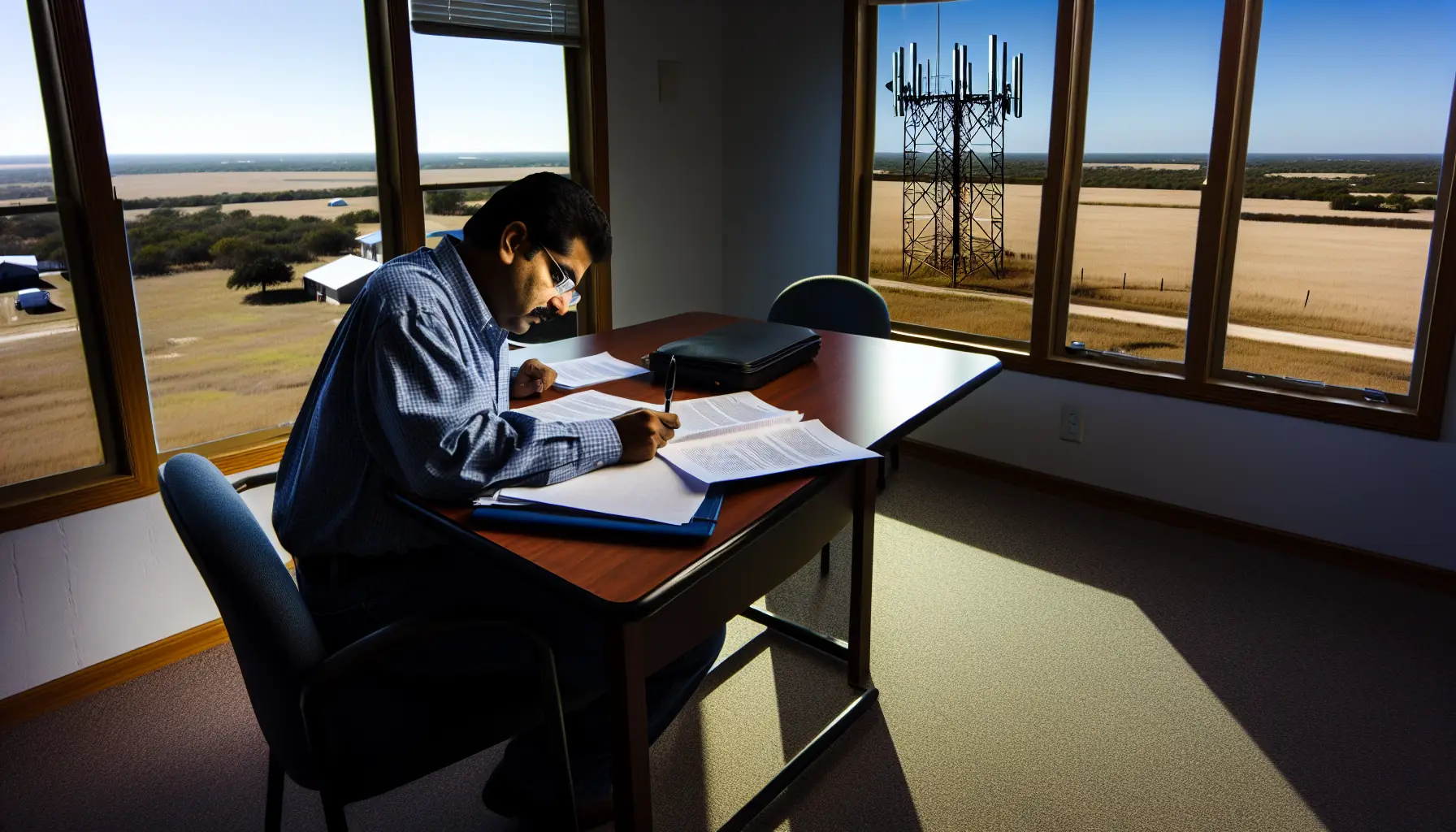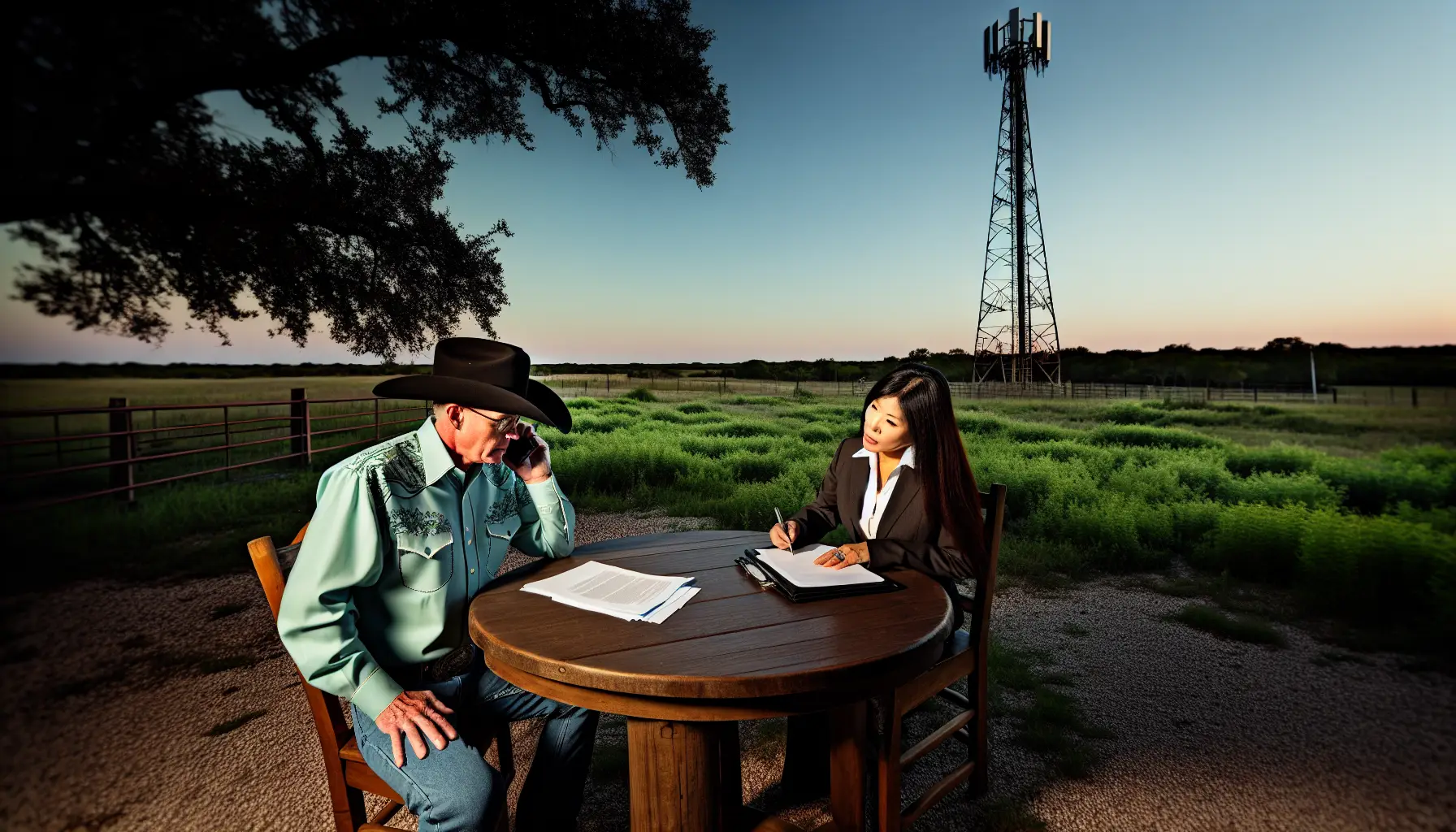Putting a cell tower on your land might sound like a good deal. Many landowners in Texas see it as an easy way to earn extra income. But signing a cell tower lease without knowing the risks can cause problems later. These agreements often last for decades and include details that can hurt property value or limit future use. Before you sign, it is worth taking a closer look at what is really in that lease.
In This Article:
Signal Interference and Shared Use Conflicts
When Towers Get Crowded
Many cell towers host more than one company. This shared use helps companies save on costs. But when more devices use the same tower, signals can interfere. Interference leads to weak reception or dropped calls. In a fast-growing Texas area, weak cell service can affect land value.
If people cannot get strong service on your land, they may not want to live or do business there. That may hurt your chances to sell or lease later. Around busy cities like Houston, property near poor signals may get fewer offers. Cellular interference becomes a real issue over time. Landowners need to think about this before signing any cell tower deal.
Priority Rights and Access Disagreements
Some companies ask for “priority access” in the lease. This gives them the right to control upgrades or space use. If another company wants to add a device, priority rights decide who gets in first. These choices often ignore the landowner’s needs. Disputes between providers can cause delays or legal trouble.
Some landowners do not even know when other companies add equipment. This can lead to overuse or safety concerns. If rules in the lease are not clear, problems will follow. The landowner may get stuck in the middle of a disagreement. It is important to review shared-use terms carefully before agreeing to them.
Restrictions on Future Land Use
What You Can Build Might Change
Many cell tower leases include land use restrictions. These rules limit your freedom to build on or sell the land. For example, you may not be allowed to add buildings or dig near the tower. These limits often stay in place for the whole lease term.
If you want to build a home later, the lease could block that. If you wanted to divide and sell the land, the deal might say no. That means fewer options and less value. These long-term limits can become more serious as the area grows. If the land is in high demand, the lease could hold back your ability to profit.
Hidden Clauses Lower Property Value
Future buyers often ask about lease terms. If the lease gives the tower company too much control, buyers may walk away. Real estate investors prefer clear ownership and few outside ties. This is especially true in Texas, where rural and urban land values can rise fast.
Being stuck in a bad lease may stop you from getting full value when you sell. Buyers will be cautious if the lease impacts their own use rights. Even newly built towers can have terms that last 30 years or more. These are often written in ways that favor the company, not the landowner.
What Happens When the Tower Is No Longer Needed?
Outdated Equipment Stays in Place
Technology changes quickly. Today’s tower could be outdated in five years. Some companies will stop using the tower but leave the pole behind. Without clear terms in the lease, you might be stuck with an unused structure. Some landowners in Texas have reported towers that stand for years, unused and rusting.
Unused towers hurt the image and value of your land. They can also cause safety or environmental problems. A clean removal plan in the lease helps prevent this. Many landowners fail to ask about it before signing. That mistake can lead to ugly and costly surprises later on.
The Importance of a “Sunset Clause”
A smart lease should include a sunset clause. This clause explains what happens when the tower is no longer needed. It should set a time limit for taking down unused equipment. It also should say who pays to do it. Without this, you might get stuck with the cost.
Some leases place cleanup duties on the landowner. That may include removing concrete, fencing, or underground lines. Each piece adds to the cost and labor. It is better to decide these details at the start. That way, you are not left alone to deal with a dead tower.
Equipment Ownership and Liability Confusion
Defining Who Owns the Tower
One key part of any lease is who owns what. If the lease is not clear, you might be responsible for the tower. If it breaks or causes harm, others might blame you. That includes fires, collapse, or injury. Some landowners find out too late that they were listed as the owner through vague wording.
This problem often shows up during land sales or lawsuits. Clear rules about tower ownership help avoid blame and confusion. The lease should say the company owns the tower at all times. It should also say what they must do at the end of the deal. If these parts are missing, the landowner is left guessing.
Returning the Land to Its Original State
Once the lease ends, restoring your land may take time and money. Some providers remove the tower but leave behind damage. Worn soil, concrete pads, or cables underground may remain. These can block other land uses or even attract penalties from city officials.
The lease should include site restoration rules. These require the company to return your land to a usable state. You should also ask for photos before and after work. That helps show what needs fixing. Many people forget this step, then face costs later. Taking these steps protects your property and keeps future uses open.
Lease Transfers and Ownership Changes
Assignment Clauses and Lease Fragmentation
Cell companies often sell or transfer leases to other companies. This is called lease assignment. On paper, it seems harmless. But changes in leaseholders can mean delays in payments or repairs. If the lease splits between many parties, things get more confusing.
You might not know who owns the tower anymore. Calling the wrong company with an issue wastes time. Some owners fail to keep contact details up to date. These gaps leave landowners in confusion and can cause missed income. The lease should list rules about transfers and updates. Those rules reduce problems when the lease changes hands.
Who Pays When Something Breaks?
If storm damage happens, you will want fast repairs. But if ownership is unclear, you may not know who to contact. In Texas, severe weather is common, and quick fixes matter. The wrong lease may push these duties onto you. That becomes more serious with towers using heavy or risky equipment.
Good leases should name who fixes and maintains each item. The lease should also require that the provider has insurance. That way, accidents do not become your burden. These steps help protect both your land and your wallet. Do not assume standard leases always include them.
How Legal Support Can Help Manage the Risks
Spotting Risk Before You Sign
A detailed review of the lease is the best first step to avoid harm. Every land lease is different. An experienced real estate lawyer in Houston TX will know how to read between the lines. They can find clauses that limit land use or put unfair duties on the landowner.
These terms may look normal to someone unfamiliar with real estate law. But they often hide risks that last for years. Many landowners sign leases with incomplete or unclear terms. Once signed, it is hard to make changes. That is why it is smart to review before committing. The cost of a mistake can far outweigh the cost of solid advice upfront.
Custom Terms That Fit Your Land
No two land parcels are the same. That is why standard leases may not reflect your plans or land use. If you also hold mineral rights, the tower may conflict with drilling or oil disputes in the future. A good mineral rights lawyer in Texas will see how a tower might affect those rights.
Adding terms like early exit options, clean-up clauses, and signal limits can make a big difference. You can also ask for better rent terms or land use payments. These custom details help protect your land, just like clear deeds or titles do. If the agreement does not match your long-term plans, it is time to revise it.
Conclusion
Cell tower leases come with both income and risk. From signal problems to land use losses, each issue matters. Without careful planning, these risks can harm your land’s value and your future options. As more areas grow and change in Texas, land use laws, oil rights, and property law become even more important.
Understanding the full picture of a tower lease helps you avoid regret later. This means knowing who owns what, how repairs are handled, and which rules control your land. If managed well, a lease can create steady income. But if handled poorly, it can cost you much more than it pays.
If you want to make sure your lease protects your long-term goals, the team at Daughtrey Law Firm can help make sense of complex terms and land use limits. Their deep insight into real estate and mineral law makes them a good choice when planning around your land’s future in Texas.










